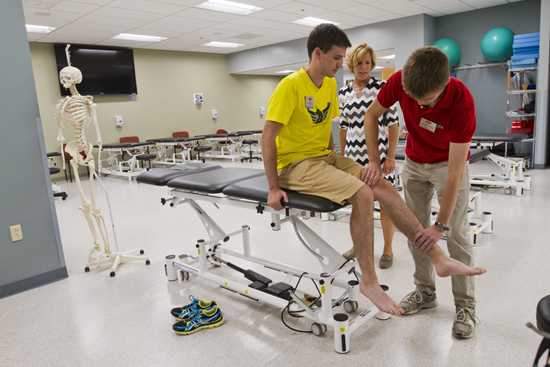Wanted: Leader with Research, Health Care Experience
Committee launches search for new Sargent College dean

Cyprien Jungels (SAR’16) (right) practices on Bryan Case (SAR’15) during a session with Sara Brown, a SAR clinical associate professor of physical therapy and athletic training. Photos by Chitose Suzuki
University officials recently appointed a diverse group of faculty and staff to find a successor to Gloria Waters, former dean of Sargent College, who stepped down last June to assume her new role as BU vice president and associate provost for research.
Kathleen Morgan, a SAR professor and chair of health sciences, is serving as interim dean through the transition.
“Finding an individual with the talent, insight, and vision to lead Sargent College into the future is not a task we take lightly,” says Jean Morrison, University provost. “Sargent College is an essential component to both our undergraduate mission and research enterprise at BU. This significance will only continue to grow as the role and necessity for quality health care for our population faces rapid expansion.”
David Barlow, a College of Arts & Sciences professor and chair of psychology, heads the Sargent College dean search committee, which met for the first time last week. Among the members are representatives from three Sargent disciplines: Swathi Kiran, an associate professor of speech, language, and hearing sciences, Karen Jacobs (SAR’79), a clinical professor of occupational therapy, and Sara Brown, a clinical associate professor of physical therapy and athletic training. Kenneth Lutchen, College of Engineering dean and a professor of biomedical engineering, will provide his perspective as a current dean. Comprising the rest of the committee are Timothy Barbari, associate provost for graduate affairs and an ENG professor of biomedical engineering, Yvette Cozier (SPH’94,’04), a School of Public Health assistant professor of epidemiology, and Janelle Heineke (GSM’92), a School of Management professor and chair of operations and technology management.
The committee’s first charge is to review the position description, make any necessary changes, and circulate it as widely as possible to attract top-notch candidates worldwide. Committee members will sort through applications and arrive at a consensus on the top four or five. This select group will then be presented to Morrison and President Robert A. Brown, who will interview their choices before making a final decision. Although the provost requested a list of names by early April, Barlow hopes to have final selections in as early as February.
A start date for the new dean would be negotiated, but “everyone’s hope is that someone could start the next academic year,” Barlow says.
In addition to possessing integrity, enthusiasm, and management experience, the ideal candidates should be “on the cutting edge of health care policy and health care delivery systems,” says Barlow, and should intimately understand the complexities of research—which include not only how to conduct it, but also how to obtain funding and resources.
As a clinician and researcher, Kiran would like to see candidates who are high-caliber scientists, appreciate both the clinical and academic sides of the college, and want to continue elevating SAR’s research portfolio in the fields of rehabilitation and health sciences.
Jacobs says that the next dean should have an international reputation, especially considering that he or she will be the official representative of SAR’s top-ranking science programs. As the program director of the online postprofessional doctorate in occupational therapy, Jacobs also wants to see candidates who both understand and will promote the expansion of online education.
On a more personal note, she says she and her colleagues “need somebody who’s going to join our family,” adding that “there’s a lot of camaraderie between faculty.” She hopes the next leader of the college will continue to encourage interprofessional education and training to foster that connectedness.
Perhaps the toughest job the new dean will face is replacing the well-liked and highly respected Waters, who had led the college since 2005. Known among faculty simply as Gloria, Waters earned a reputation as a leader who consistently landed funding for research and enhanced the visibility and standing of the college’s various programs, all while conducting her own aphasia research.
The right candidate “has some big shoes to fill,” Barlow says. “Gloria left the college in a very healthy and vibrant state that will enable a new dean to take it to the next level.”
Comments & Discussion
Boston University moderates comments to facilitate an informed, substantive, civil conversation. Abusive, profane, self-promotional, misleading, incoherent or off-topic comments will be rejected. Moderators are staffed during regular business hours (EST) and can only accept comments written in English. Statistics or facts must include a citation or a link to the citation.